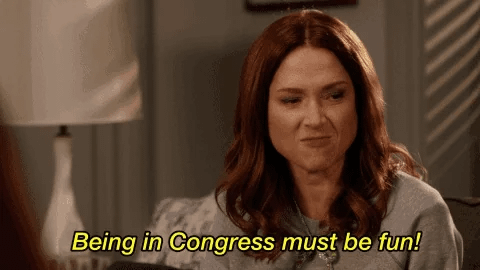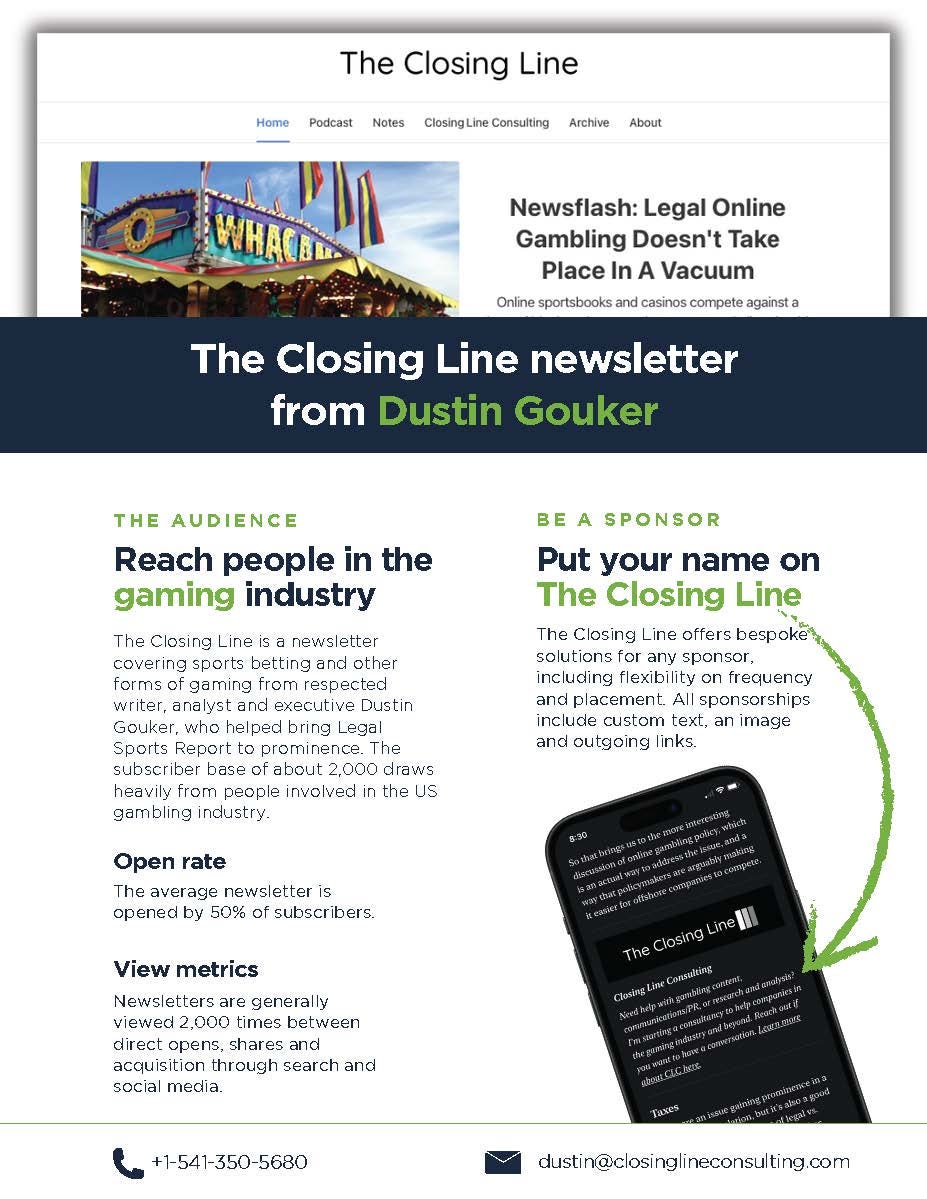The Current: Congress Vs. Sports Betting
Three takeaways from today's Senate Judiciary hearing on gambling in sports
TCL will offer a newsletter on something new in the US gambling space in The Current every Tuesday.
There was a Congressional hearing on sports betting this morning in the Senate Judiciary Committee. I am not going to offer a blow-by-blow of the hearing; if you are interested in that content, I’ll link it in the newsletter tomorrow. If you’re a masochist, you can watch it here.
Instead, here are some takeaways (and as usual, there is a gambling roundup at the end of this post):
Good luck doing anything in the next Congress
I am a huge seller on the idea that we’ll see meaningful federal action because of this hearing. It was held during a lame-duck session and called for by a Democratic chairman whose party is leaving power.
Join 100s of operators automating their trading with OpticOdds.
Real-time data. Proven trading tools. Built by experts. Unlock complimentary access until year-end at www.opticodds.com.
However, enough different efforts are floating about at the federal level that the risk profile of some intervention is not zero. I do find the idea that we’ll see overarching federal regulation get to the finish line (ie the SAFE Bet Act) exceedingly unlikely. Consider:
Republicans are coming into power with the idea of slimming down government and getting rid of regulations. At the macro level, creating new federal regulations for anything is anathema to what the Republican Party is looking to do as it takes over the legislative and executive branches. (As an aside, one Republican lawmaker used the hearing as a chance to question NCAA President Charlie Baker on transgender athletes.)
Former top New Jersey gaming regulator David Rebuck hammered home today that sports betting has been a state issue to date. Republicans are usually (but not always) supportive of states’ rights rather than prescribing federal interference.
The sponsors of the SAFE Bet Act are Democrats.
That all adds up to an environment that’s not conducive to creating negative outcomes for the sports betting industry.
Also, it’s ridiculous we held a hearing about sports betting with literally no one representing the actual sports betting industry. More from the American Gaming Association on that.
LOL at banning ‘negative bets’
Former NFL player Johnson Bademosi testified on Tuesday representing the league’s players' association. He wins my award for the most ridiculous policy prescription in the hearing: banning bets on ‘negative’ outcomes to stop heckling of athletes. Presumably, we’re mostly talking about bets on the “under” of a player prop or stuff like betting on a player to strike out in baseball or throw an interception in football.
Doing this would accomplish almost nothing in the current US sports betting landscape and arguably would hurt. Bettors are far more often complaining to and harassing athletes because of a poor performance for not hitting an over — not scoring enough points, missing a crucial shot, etc. Betting overs is way more popular in American sports betting. The idea that stopping a “negative outcome bet” is going to improve anything is wildly misguided.
(Also go on social media/Twitter/X any time a meaningful player gets hurt or taken out of a game early and see how many bettors are complaining that they didn’t hit an over or are whining to get their bets refunded.)
Anyway, this is a silly prescription. It’s not helping athletes and it would be a worse outcome for sports bettors not being able to bet both sides of a two-way market. Please don’t do this.
Not enough resources for problem gambling
National Council on Problem Gambling President Keith Whyte was one of the witnesses on Tuesday, and as he always does, he provided reasonable testimony.
Whyte noted that while there has been a lot of money earmarked for state problem gambling programs, the public investment has trailed money going to substance abuse programs by a wide margin. He’s correct that that should change.
The gambling industry would like the federal excise tax on sports betting (.25% of handle) to go away entirely. But that seems unlikely in the short or long term. Whyte and the NCPG support the GRIT Act, which would earmark half of the excise tax for gambling addiction treatment and research.
There are certainly worse outcomes than the GRIT Act passing. I get why the gambling industry doesn’t want to accept the excise tax into perpetuity, but this is a good way to help now, with a lot of money in one fell swoop. I would love to see the GRIT Act halve the federal excise tax and then send all the money to gambling addiction funding.
Gambling industry reverse job board
Are you looking for work in the gambling industry? Or are you hiring? I created a resource to match employees with employers with almost 200 job seekers so far. Check it out here.
Statement from iDEA Growth
The iDevelopment & Economic Association offered this statement before the hearing, which sums it up pretty well for me.
“Proposals by Congress to regulate sports betting represent unnecessary federal interference in a system that is working effectively. States have taken the lead in regulating sports betting, crafting solutions that address their individual economic, social and cultural considerations. These efforts have not only established robust consumer protections but have also supported economic growth by creating jobs and generating significant funding for critical state programs.
“Imposing federal mandates on sports betting would risk undermining this progress and introduce confusion and inefficiencies in a regulatory environment that is functioning well. Federal intervention threatens to stifle innovation, disrupt state economies and jeopardize the benefits that regulated sports betting has delivered to communities across the country.
“Sports betting is a bipartisan issue, with support among both Republican and Democratic voters. This demonstrates that the current state-led approach is not only effective but widely embraced by the public.”
US gambling roundup
Pennsylvania hits a new record high for gaming revenue in November on the strength of sports betting and online casinos. Total retail casino revenue was up year-over-year as well.
A federal appeals court dismisses a case in Washington state that was challenging a compact allowing tribes to offer sports betting.
Closing Line Consulting
Need help with gambling content, navigating the North American gaming industry, communications/PR, or research and analysis? I have a consultancy to help in gaming and beyond. Reach out if you want to have a conversation. Learn more about CLC here.
For sponsorship inquiries, email dustin@closinglineconsulting.com.








I agree with you Dustin that we won’t get any movement on federal sports betting legislation with a republican trifecta taking over but the possibility of cooperation with democrats in bipartisan legislation is possible….. As far as the negative bet discussion, I see it similar to Colorado and how https://docs.google.com/spreadsheets/u/0/d/1Ib3Gn_xKcmuIJ9tjKKE8MJJNNYGFpwS-Eo1x9ZwHpL4/htmlview?pli=1# they got rid of certain ones….. Either way a lot of states in their legislatures/ gaming commissions will focus on adjusting the legislation in 2025 and I don’t know in my state of Nevada I’m not sure what they’d do on a state level but federally Titus opposes any federal legislation and Cortez masto and Rosen as well so I’d think they’d oppose it or get a exemption eg paspa if we see it.